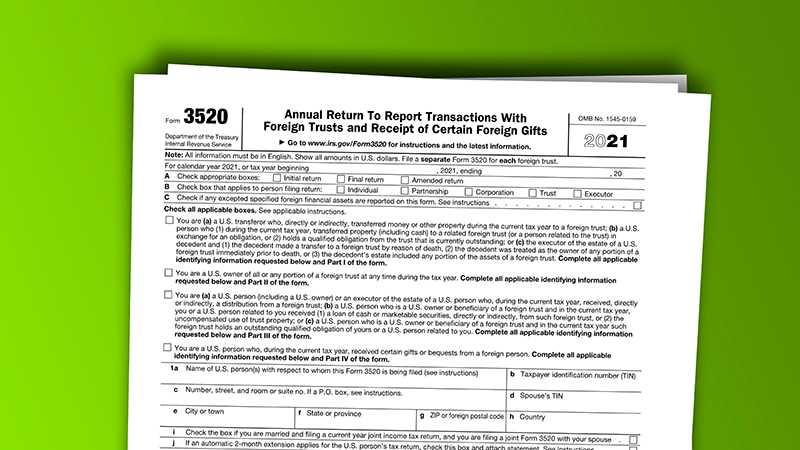Recognizing the Importance of Coverage Foreign Inheritance to IRS for Tax Compliance
Maneuvering the intricacies of international inheritance requires a clear understanding of IRS reporting commitments. Many people underestimate the relevance of accurately reporting these possessions, which can lead to unintentional effects. Failing to adhere to IRS regulations may lead to substantial fines and lawful difficulties. It is vital to grasp the nuances surrounding international inheritances to stay clear of pitfalls. The complying with areas will certainly make clear critical elements of conformity and the possible risks involved.

What Constitutes Foreign Inheritance?
When a specific obtains properties from a dead individual's estate located beyond the USA, this transfer is considered a foreign inheritance. Foreign inheritances can include various sorts of assets such as realty, bank accounts, investments, personal possessions, and company interests. The value and nature of these assets might vary noticeably depending upon the legislations and custom-mades of the country in which the estate lies.
Additionally, the procedure of getting these properties can include navigating through international lawful systems, which may impose specific needs or tax obligations associated with inheritance. The recipient may also encounter obstacles in figuring out the fair market price of the inherited assets, specifically if they are not accustomed to the regional realty or economic markets. Understanding what makes up an international inheritance is crucial for individuals to guarantee conformity with both regional regulations and any type of possible responsibilities they might have in their home nation.
IRS Reporting Needs for Foreign Inheritance
How does one guide with the IRS coverage demands for foreign inheritance? Individuals that get an inheritance from abroad must know certain reporting obligations to ensure compliance with IRS laws. The Foreign Bank and Financial Accounts Record (FBAR) is one necessary requirement; if the complete value of international accounts exceeds $10,000 any time during the year, it needs to be reported. Additionally, Type 3520 may be required for reporting international gifts or inheritances over $100,000 from non-U.S. persons. This type records details regarding the inheritance, including the source and quantity. Failing to abide by these coverage needs can result in substantial fines. It is important for receivers to keep complete documents of the inheritance, including any type of documents from foreign entities. Consulting with a tax specialist well-informed regarding global tax legislations can offer more advice in steering with these reporting commitments effectively.
Tax Ramifications of Obtaining an Inheritance From Abroad
Receiving an inheritance from abroad can carry significant tax effects for individuals, specifically as they navigate the complexities of worldwide tax obligation regulations. The IRS requires U.S. citizens and locals to report international inheritances, which might cause numerous tax obligation commitments - reporting foreign inheritance to IRS. Although inheritances themselves are usually not considered taxable revenue, coverage is vital to avoid penalties
In addition, the estate might go through inheritance tax in the international nation, which might affect the net worth gotten by the beneficiary. If the inheritance includes international assets, such as genuine estate or investments, they may feature special tax considerations, consisting of possible funding gains taxes upon sale.
In addition, individuals might require to follow international tax obligation regulations, which can vary considerably from united state regulations. Understanding these effects is essential for correct tax conformity and to ensure that all obligations are fulfilled without incurring unneeded expenses or lawful problems.
Typical Mistakes to Prevent When Reporting Inheritance

Steps to Guarantee Compliance With IRS Laws
Recognizing the steps necessary to guarantee compliance with IRS guidelines is vital for anyone reporting a foreign inheritance. Initially, people need to validate whether the inheritance surpasses the reporting threshold, which can set off additional requirements. Next, it is essential to gather all relevant documents, consisting of the will, count on documents, and documents of the international estate's value.
Submitting Kind 3520, which particularly attends to foreign presents and inheritances, is important to notify the IRS of the inheritance. Individuals should also Discover More Here ensure that any type of appropriate tax obligations connected to the inheritance are paid, including prospective estate taxes in the foreign territory.
Additionally, maintaining precise records of all purchases and communications regarding the inheritance can provide needed support in instance of an IRS questions. Seeking specialist guidance from a tax advisor acquainted with international tax obligation laws can additionally enhance conformity and mitigate dangers connected with reporting international inheritances.
Often Asked Inquiries

What Happens if I Fail to Record My Foreign Inheritance?
Failing to report an international inheritance can result in significant fines, rate of interest on unpaid tax obligations, and potential lawful consequences. The IRS may pursue enforcement activities, complicating future economic transactions and conformity responsibilities for the individual included.
Can I Subtract Costs Connected To Receiving Foreign Inheritance?
No, costs connected to getting an international inheritance are normally not insurance deductible for tax objectives. Inheritance itself is usually ruled out taxable earnings, and linked costs can not be declared to reduce tax obligation responsibility.
Are There Fines for Late Reporting of Foreign Inheritance?
Yes, there are fines for late reporting of foreign inheritance to the IRS - IRS Form 3520 inheritance. These can consist of penalties and interest on unsettled tax obligations, making timely disclosure vital for conformity and preventing added financial concerns
Exactly How Does Foreign Inheritance Influence My State Tax Obligations?
Foreign inheritance might impact state taxes in different ways depending on jurisdiction. Some states enforce inheritance or inheritance tax, while others do not. It is necessary to seek advice from neighborhood guidelines to identify specific tax ramifications associated with international inheritance.

Are Gifts From Abroad Taken Into Consideration Foreign Inheritance for IRS Purposes?
Gifts from abroad are not classified as international inheritance for IRS objectives. reporting foreign inheritance to IRS. Rather, they are dealt with separately under gift tax obligation regulations, with different reporting requirements and thresholds that people have to stick to for compliance
Furthermore, the procedure of getting these properties can involve maneuvering with foreign legal systems, which may enforce certain needs or tax obligations related to inheritance. The IRS requires U.S. residents and locals to report foreign inheritances, which may cause different tax obligation commitments. Submitting Type 3520, which especially deals with foreign gifts and inheritances, is crucial to inform the IRS of the inheritance. Stopping working to report an international inheritance can lead to substantial fines, interest on overdue tax obligations, and potential legal consequences. No, expenditures associated to getting an international inheritance are normally not deductible for tax purposes.